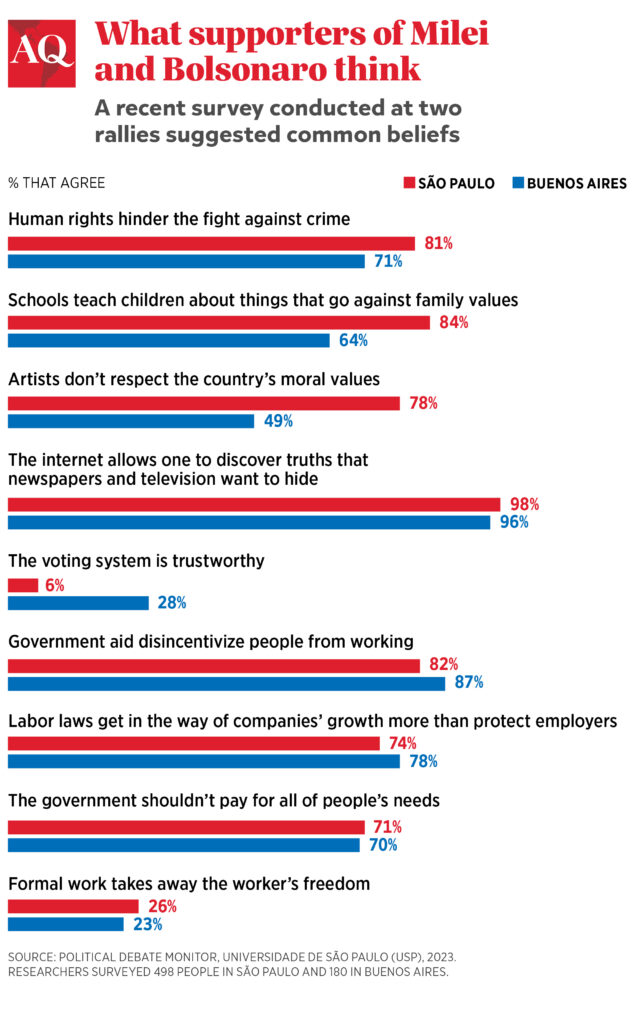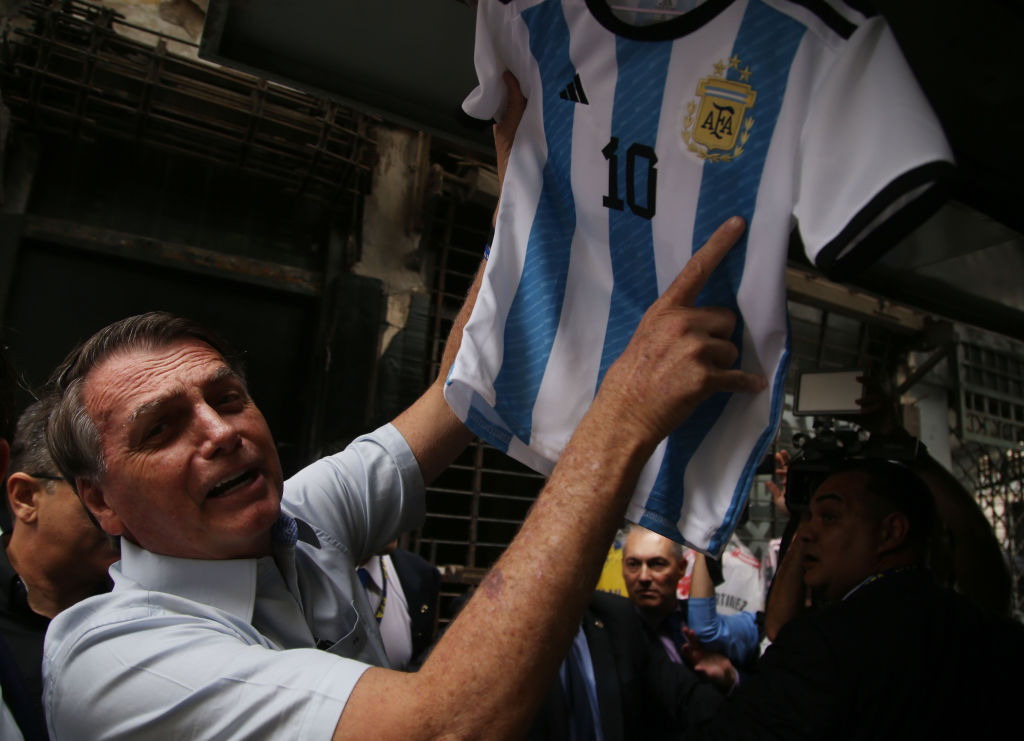SÃO PAULO — A debate has erupted among analysts about whether President Javier Milei could be the “Argentine Jair Bolsonaro.” The presence of the former Brazilian president at Milei’s inauguration, where he was treated almost like a current head of state, is suggestive of the alliance that is taking shape. But what ideas is it based on, and how cohesive is this coalition?
Some commentators point to the similarities between the two: Both positioned themselves against the establishment, criticized elites and used incendiary rhetoric against the left. Those who prefer to highlight the differences between them note that while Bolsonaro is a former army captain with a discourse based on social conservatism, Milei is a professional economist who emphasizes economic issues.
To investigate how this comparison plays out among supporters of each, our research team at Universidade de São Paulo partnered with colleagues at the Universidad Nacional de Lanús. We presented participants of rallies in support of Milei and Bolsonaro with a set of statements on economic, social and political topics, to see how each would respond.
In Buenos Aires, the survey was given to 180 people among a crowd at Milei’s closing rally just before the first round of the election, in October; In São Paulo, the survey was given to 498 people who were attending a protest in November, following the death of a Bolsonaro supporter in prison.
We recognize our results do not constitute a formal poll of these two voter bases; instead, they only reflect active supporters of these politicians, people who took to the streets at a specific place and time. But if we take these activists as a kind of vanguard that is projecting its influence on broader society, it seems the comparisons between Milei and Bolsonaro are not so misplaced.
Comparing the politicians
Milei’s election campaign had two clear themes: the economic crisis that the country is going through and public safety. He promised to overcome the economic crisis with a libertarian economic agenda, with deep cuts to public spending, ambitious privatization plans and the dollarization of the economy. On public safety, he promised a tough approach to the fight against crime.
This focus on the economic agenda contrasts sharply with Bolsonaro’s first presidential campaign in 2018, which was mostly focused on issues such as supposed threats to the notion of the “traditional family”. The then-candidate said he preferred not to answer questions about economic policy at all, and that journalists interested in this topic should directly seek out his future finance minister.
Despite these differences, there are other reasons to believe Milei and Bolsonaro might not be so different. Milei himself sometimes described his politics as “paleolibertarian”, a term that, in the United States, means a fusion of paleoconservatism with economic libertarianism. During the campaign, Milei occasionally made reference to subjects linked to social conservatism, such as the right to bear arms, the fight against so-called gender ideology in schools and the questioning of official estimates of the number of victims of the military dictatorship (1974-83). In addition, researchers who followed the rise of the new right in Argentina note that economically libertarian ideas are generally paired with a socially conservative component in the discourse of those groups.
Comparing the supporters
Who were the protesters we interviewed at the bolsonarista and mileísta rallies? In Buenos Aires, 70% of participants were under the age of 34. In São Paulo, 72% were over 45 years old. In Buenos Aires we were also struck by the fact that there were many people of mixed race and who came from poor neighborhoods and towns. This is not usually the case in bolsonarista rallies, which are often composed largely of white, middle-class people.
However, when we look at the survey numbers, there is a lot in common.

The rate of agreement on economic issues was very similar between the crowds in São Paulo and Buenos Aires. Both bolsonaristas and mileístas see government programs providing benefits as a disincentive to work and labor laws as an obstacle to companies’ growth.
On social issues, the numbers are not always so similar, but on two of them they are: the ideas that the protection of human rights hampers the fight against crime, and that the internet reveals truths that the mainstream media hides.
If we bear in mind that we are talking about two different countries, and that the demographics of Milei’s and Bolsonaro’s supporters are very different, the similarities seem much more significant than the differences. The research suggests that there is a shared political culture among Brazilian and Argentine right-wing activists, one that fuses economic libertarianism, social conservatism and anti-elite populist discourse.
—
Ortellado is a professor at the public policy management course at the School of Arts, Sciences and Humanities of Universidade de São Paulo (USP)





